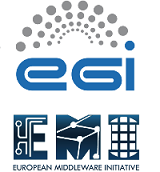Speakers
Conclusions
Close interaction across European DCIs is key to unleashing the full potential of e-Infrastructures in a rapidly changing landscape. By sharing experiences and insights, DCIs will play an important role in shaping the future e-Infrastructure landscape by gaining a better understanding of the different roles played by Cloud and Grid computing. By zooming in on community-centric services from a Cloud computing perspective, the Workshop will showcase ways in which we can arrive at enhanced e-Infrastructures and the technical advances that will make it possible. The Workshop also offers the perfect setting to foster further co-operation across DCIs and beyond, with the aim of ensuring we capitalise on European experiences and investments. Finally, it is an opportunity to share knowledge on eTraining approaches not only to enable end-user groups but also to educate graduate and post-graduates moving to industry where Cloud computing skill sets will play an increasingly important role.
Overview
Cloud Computing offers a new route to accessing computational infrastructure with the potential to transform how a broader spectrum of researchers than is currently possible carry out their work. VENUS-C is a European Distributed Computing infrastructure that brings together industry and scientific user communities to develop, test and deploy a scientific Cloud computing service for Europe. Current user communities involved are: bioinformatics, systems biology, drug discovery, civil engineering, civil protection and emergencies and data for science (Aquamaps – D4Science). The applications target a broad set of beneficiaries, from architects and engineering to fisheries and SMEs, among others. An Open Call launched in January 2011 aims to expand this current set of scenarios. In order to understand how Cloud computing fits in the e-Infrastructure landscape, VENUS-C is working with other DCI projects in a number of activities, as well as the Enabling cloud for eScience(ECEE)initiative.
Impact
The Digital Agenda highlights Europe’s strategic priorities to boost innovation and competitiveness across EU27. Defining a European strategy for Cloud computing underpinned by policy assessment are among the priorities set. At national level there is also a significant desire to increase the efficiency of research by leveraging new technological advances, including distributed computing, shaping roadmaps to seize new opportunities as they emerge. The Workshop offers an important forum to understand the different roles played by distributed computing technologies in scientific settings, particularly how Europe can drive forward enhanced e-Infrastructures underpinned by community-centric services. For example, the advantages of Grids supporting data gathered by a multitude of sensors and instruments coupled with the advantages of Cloud computing to empower a broader spectrum of researchers, most of whom conduct small-scale computing and have to date been largely excluded from the distributed computing arena. Specifically, the Aquamaps presentation will illustrate tangible benefits for fisheries and aquaculture resource management communities, a large target group not only in Europe but also globally, bringing on board organisations such as FAO, among others, enabling a quicker way to map species, and ultimately provide scientists and decision makers with more information, faster. This talk will also perfectly illustrate how Cloud computing can sit alongside grid-enabled technologies for enhanced e-Infrastructures. The Structural Analysis presentation will illustrate how Cloud computing can benefit a broad community of professionals spanning architects, structural and civil engineers, especially SMEs, through easy deployment of end-user services. From a VENUS-C perspective, the Workshop is also an important opportunity to explore top-level technical challenges with other DCIs and define how collaboration with other DCIs can be further developed moving forward.
Description of the work
This Workshop will showcase a number of current VENUS-C user scenarios, such as Aquamaps, which stems from the D4Science scientific data infrastructure and Structural Analysis, illustrating benefits to target groups spanning fisheries and Resources Management, Biodiversity communities together with opportunities for research and SMEs. Preliminary outcomes of the Open Call will be presented along with the project’s approach to eTraining aimed at supporting end-user communities in cost-effective ways. The Workshop will also explain technical implementations to date aimed at providing an open and generic Application Programming Interface (API) at platform level for scientific applications, striving towards interoperable services. The technical overview will describe the VENUS-C platform, which is be based on both commercial and open source solutions underpinned by the Engineering data centre, Microsoft through the Windows Azure and its European data centres, and two European High Performance Computing centres: the Royal Institute of Technology (KTH) and the Barcelona Supercomputing Center (BSC). It will also pinpoint the project’s evaluation of open source solutions, such as EMOTIVE and OpenNebula, as well as explore technical issues, such as Programming models, Application Security, Monitoring and Accounting, Networking and Network Security. Finally the Workshop will present a shared approach to Cloud computing across European initiatives by leveraging the synergy with ECEE for pan-European perspectives on Cloud. ECEE will highlight new opportunities that are emerging at national level based on a shared roadmap, with the aim also of gaining a better understanding of enhanced research efficiency. Discussions will seek to draw on current experiences in distributed computing to shed light on the roles that different technologies play in European scientific settings. Outcomes will be widely disseminated through the VENUS-C Channel, video clips and an Executive Summary.
URL
http://www.venus-c.eu

